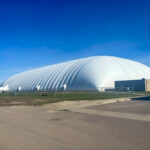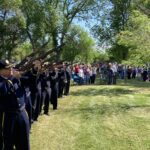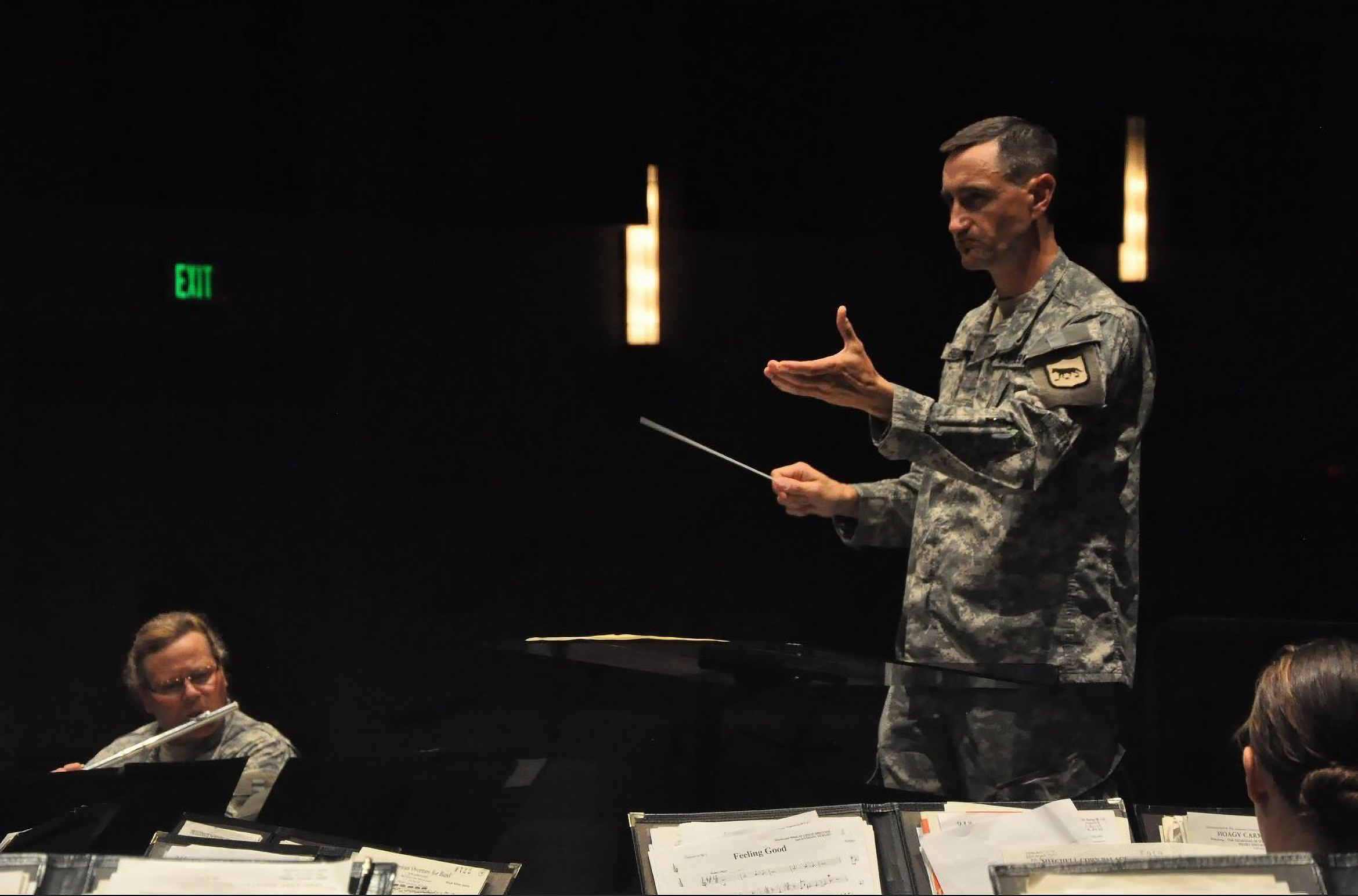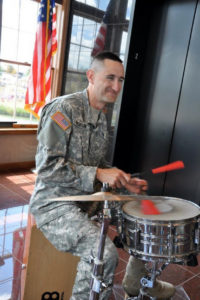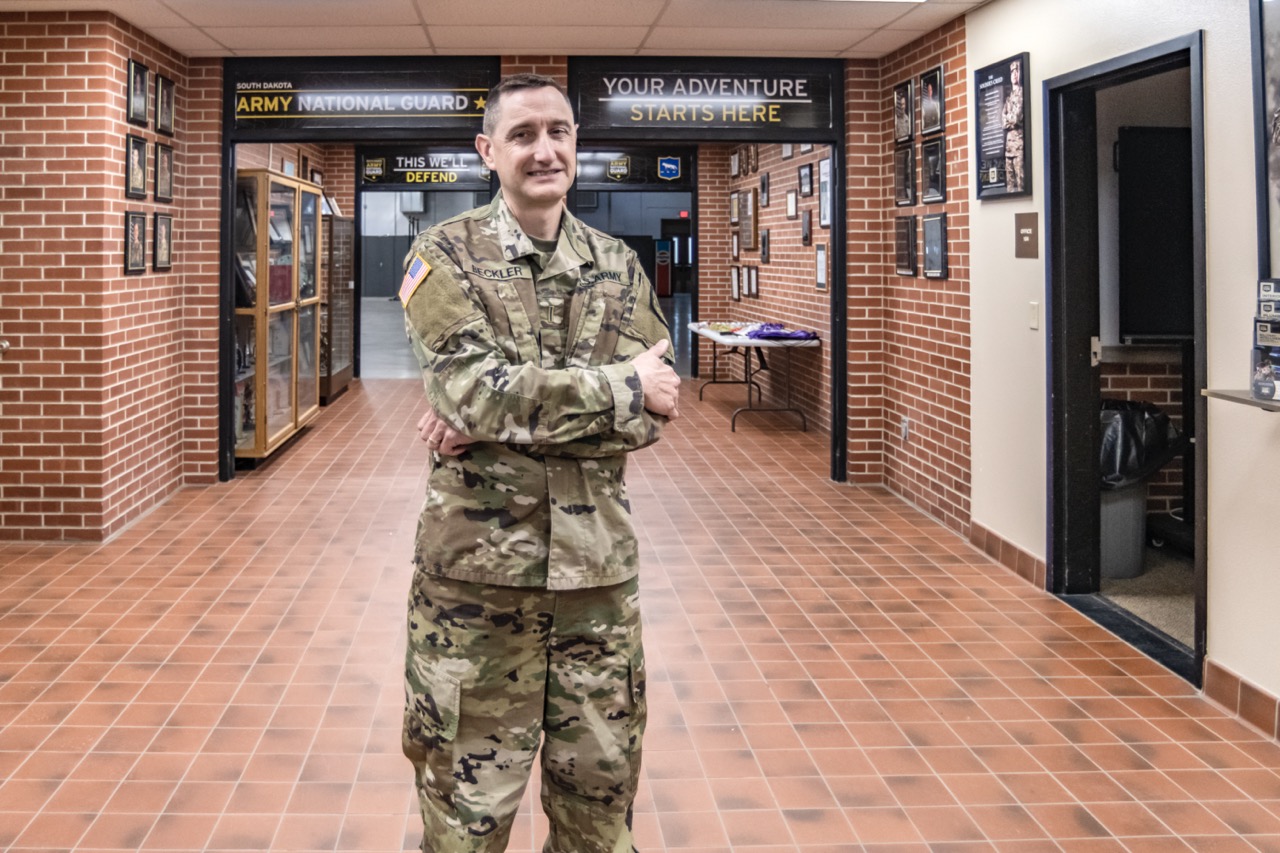

The National Guard is a study in dualities. It starts with the soldier’s dual jobs: one’s main occupation during the week punctuated with monthly weekend military drills. It also applies to the fundamental service obligations. The National Guard’s first duty is to the state. What has become common over recent decades, though, is that units can be called up to national service in times of crisis, such as war. An Army band has an additional dual service, responsible for entertaining the troops and the public with the music they perform as well as occasional military duties when required.
Terry Beckler’s job adds additional levels of dualities. For 24 years, he has served as Commander of the South Dakota National Guard band (the 147th Army Band), and at the same time for the past 16 years, he has also been a percussion professor at Northern State University. Since November 2021, he’s added another role, Chief, Army National Guard Bands, in which he oversees all 51 Guard bands, even as he still leads the South Dakota band. He is the first chief from South Dakota.
While the state role is primarily about making music, Beckler says the national job is more of an administrative role. “I’m making music happen,” he said, “but not making music.”
This is not a problem, because “I enjoy hearing the other groups as I travel around the county and help them improve their product,” he explained. “That to me is a lot of fun. Not that I have all the answers, but I can share best practices from around the country.” Fortunately, though, he still gets to make music with the 147th band.
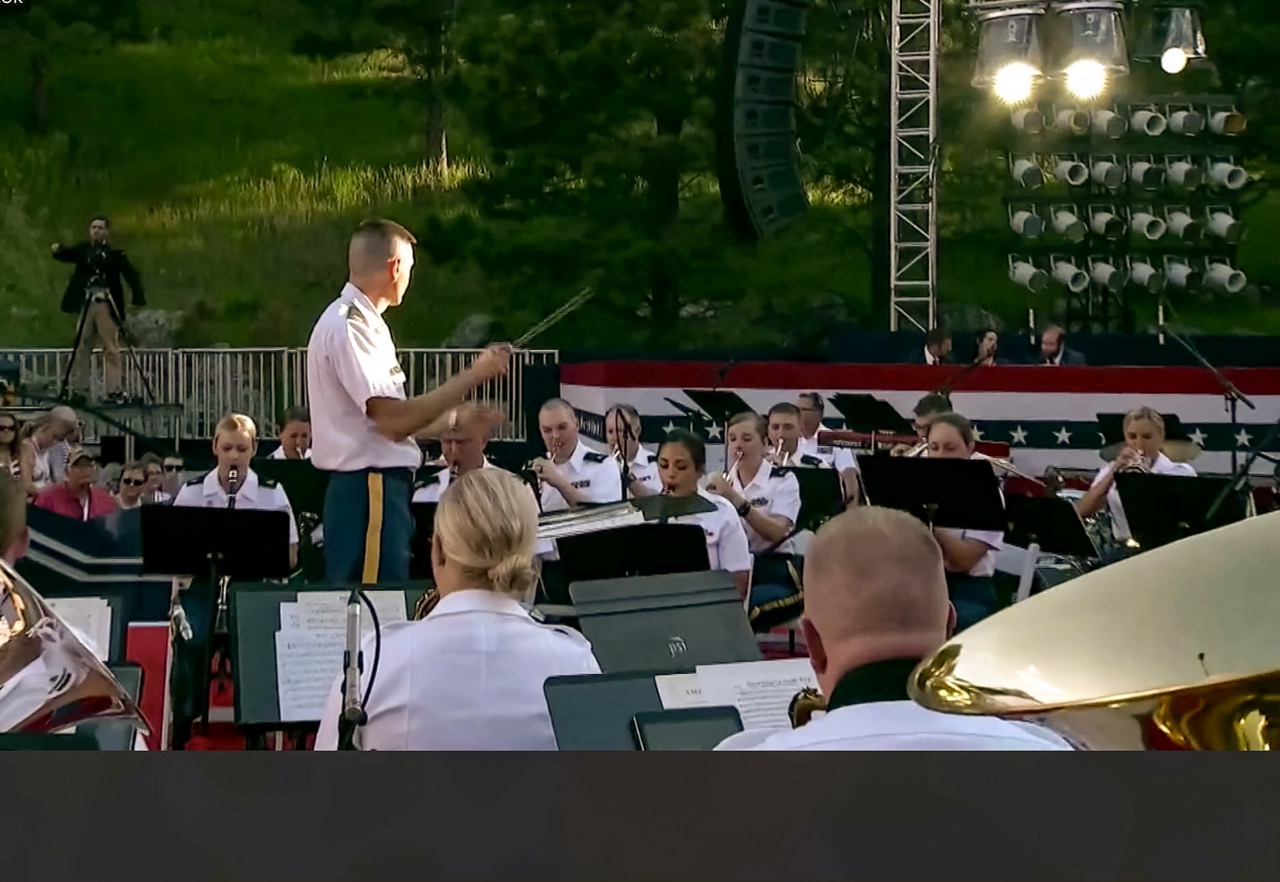
A Full-Time Job
Serving as vice chief for two years, Beckler could carry a full workload at NSU, scheduling his teaching assignments around the national duties. “One nice thing of many about being at a smaller school,” Beckler observed, “is there’s more flexibility than in other schools.” For the full-time chief role, however, he’s had to take a leave of absence from NSU.
That’s good, because in his first several months on the job, he traveled a lot, multiple times to Washington, DC, as well as Kentucky, Pennsylvania, Idaho, Virginia, and Arkansas. Generally weekend trips, when the National Guard units drill, he’s made weekday visits to the Army School of Music in Virginia, where band members train to enter a band or move up the ranks. “I try to be sure someone from the National Guard is there for graduations,” he said. He’s been gone about three weekends per month both for visits to other states and monthly South Dakota band drills. Throughout the summer, he expects to be home only three or four weekends. All this travel is in addition to spending the week in his Aberdeen National Guard Armory office working remotely with people around the country.
As well as making music happen as the chief, Beckler’s duties include evaluating the 51 Army National Guard bands, which must be assessed every five years. “Typically, we will do ten or so evaluations per year,” he said, but after pandemic disruptions, “I may do 14 this year.” The assessments cover music and support areas. He explains “I’ll evaluate the band leader as well as the readiness sergeant.” Another responsibility is “assistance visits,” in which he listens to bands and gives suggestions.
He also deals with the various parties that have influence over Army bands and is the voice of National Guard bands to the larger entities, such as the School of Music and the Adjutant General branch. “My wife says my job is to fix where there’s miscommunication somewhere,” he chuckles, “and I have had to put out a few fires in the short time I’ve had the job.”
Why did he pursue this job that curtails his music making? “Obviously for the promotion and to be promoted to the top rank in my field,” he said. “It’s also a chance to give back to the field and a great way to finish your career when you get to say you’re the senior officer in your field.” He added, “There are only a handful of jobs like this in the military where you’re the person in your field who speaks for the entire field.”
Stateside Music
Beckler joined the National Guard 35 years ago as a drummer when he was a college sophomore. “I joined the 147th in December of 1986 after visiting during a December drill,” he remembers. “My college roommate convinced me to visit, and I did the audition that same weekend. I was enlisted within about a week.” In 1998, he became commander of the 147th Army Band. Now in his 24th year in the role, he notes band commanders commonly hold the job for 20 years or more.
In the meantime, he met Susan, a fellow band member who would become his wife. He mentions, with a laugh, “It was not fraternization though; we were the same rank.” She retired from the National Guard, but the family connection has continued, as their daughter, Lindsey, joined the Guard and the band. She doesn’t live in Aberdeen, but two other current band members do. Both are NSU students, as several previous band members have been.
For his Ph.D., Dr. Beckler wrote his dissertation on the history of the 147th Band. It was the first history of the band and one of the few studies of National Guard bands. Established in 1885, the band has headquartered in Mitchell since 1921. Despite its martial purpose, the U.S. military has always seen a need for making music.
Since inception, the South Dakota band has performed for both soldiers and the public, such as for Christmas functions, patriotic holidays, and various other events. When soldiers return from deployment, for example, “We get a group to play music before and during the event.” Early in the pandemic, the band performed for a presidential visit to Mount Rushmore.
Besides the full ensemble, the South Dakota band also performs in small groups, including a country music band, a rock band with horns, a pop music band that also plays rap and hip hop, and a brass group, which covers traditional brass and popular music. Despite Beckler’s love for jazz, the Guard band doesn’t have a jazz group. “It has in the past,” he laments, but it “doesn’t fit current personnel or local interest.” Fortunately, he directs the NSU jazz band every year.
This year, all the small groups have toured schools around the state. Besides entertaining students, these concerts helped recruit for the National Guard and the band. Altogether, the small groups average around 30 performances a year, sometimes, including buglers who perform at funerals, reaching up to 60-70.
During Beckler’s career, for training and performing, the band has gone overseas four times, to Guatemala, Panama, Nicaragua, and Suriname. The last is South Dakota’s partner country, and in 2018, the band went there for its Independence Day. He particularly remembers “a performance for an orphanage in Suriname where the students sang along to our rendition of ‘Halleluiah.’”
Today, the South Dakota band, like most Army National Guard bands, is authorized at 37 people. It currently has 39 members, but Beckler says some retirements are coming, including his own. After he’s done with the chief position later this year, he will retire from the 147th Band as well and finish what will be a 24-year career as commander and almost 36 years in the National Guard.
Travel for the national chief’s job has taken him away from the state for some band drill weekends. So, he’s been training his replacement as commander, Kimberly Meyer from Nebraska, and she fills in when he’s gone. If that sounds unusual, Terry notes that it’s common for people from other states to play in the South Dakota band. “People come from Minnesota, Nebraska, and even Boston to play in the band,” he says. Women commanders are also prevalent. He notes that four of the last five state band leaders hired have been female, and there were already a number of women commanders in other states when he started as state commander in 1998. This is hardly surprising since most bands are one-third to one-half women.
Making It as a Drummer
“My parents would never believe I could make a living as a drummer,” Beckler laughs. Growing up in Bath and attending Central High School, he played polkas and waltzes in the Aberdeen area as a high school senior. “I made $85 a night in 1984!” he said. “We would play all over—smokey bars with blue haze. When I came home at 2 a.m., I’d throw my clothes in the wash and shower.”
Beckler earned a bachelor’s degree from South Dakota State University, a master’s from the University of Northern Colorado, and a Ph.D. from the University of Minnesota in 2007, all in music education. He came to NSU in 2006 and taught percussion part-time while he wrote his dissertation, then became full-time in 2007. As a percussion professor, he teaches percussion and other music classes, gives lessons, and directs sections of the NSU band. He also served four years as the Music Department chair.
As is true for most people, Beckler’s pending “bittersweet” retirement is filled with dualities too, with good and forgettable memories. “There are things I won’t miss,” he said. “I won’t miss the drive home from Mitchell after a long drill weekend, but I will miss the people.” He adds, “As I see the end in sight, I’m working through what it meant to me, getting more used to it.”
Beckler has made a lot of memorable music over the years that has made a difference for a lot of people. For him, conducting the 147th Band for the World War II memorial dedication in Pierre in 2001, just a few days after 9/11, was especially poignant. “I will always remember the nurse helping a veteran in a wheelchair stand for his service song,” he recalls, “possibly the last time he would ever do so.” //
Other Duties as Assigned
Terry Beckler’s dissertation, A History of the 147th Army Band of the South Dakota Army National Guard, shares several stories of the lesser-known parts of the National Guard band’s role, stepping in to fill military-related, non-musical duties.
The first example precedes statehood and is not exactly a National Guard story, but it sets the stage. When Lt. Col. George Custer was headed for the Black Hills, he recruited Yankton musician Felix Vinatieri to lead the Seventh Cavalry’s band. Fortunately for Vinatieri (and for his great- great-grandson, SDSU and NFL great Adam Vinatieri), Custer didn’t take the band to the Little Big Horn, leaving them behind to play “Gary Owen,” Custer’s favorite song, as the troops left. After the battle, the band performed alternate duties as corpsmen to help wounded soldiers and carry the dead.
In 1898, the state unit deployed to the Philippines for the Spanish American War. The soldiers formed a band that played regular concerts and fought in combat. Somewhat conversely, in 1916-17, the band went with the regiment to the Mexican border after Pancho Villa’s incursions into U.S. territory. Although military duty was possible, the band seems only to have performed music.
For World War I, the band deployed to Europe in 1917-19, serving in Britain and France, where they performed and did military training and duties. Its World War II mission lasted almost five years, mostly in Australia. Here, too, the band performed music as well as guard duty, unloading ships, and cleaning. They also came under Japanese attack. The band has not deployed to combat zones since World War II, even though South Dakota National Guard units have been called up for the Gulf and Afghanistan wars.
The band has also served other duties in state. Beckler recalls being on flood duty. On that topic, perhaps the most famous non-combat duty of the South Dakota Guard was the June 1972 Rapid City flood that killed more than 200 people. In the area for annual training, Guardsmen assisted in many response efforts, including rescuing people from the raging Rapid Creek. Band members helped with search and rescue and guarded the water supply. In a somber part of their music duty, they also played for the funerals of two Guardsmen who died in rescue attempts.





